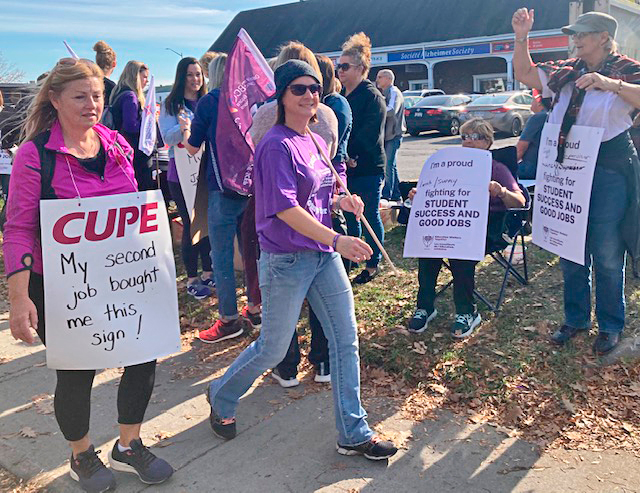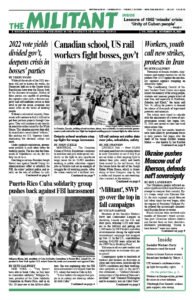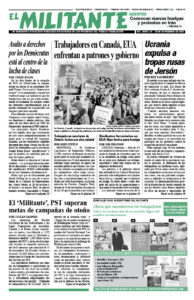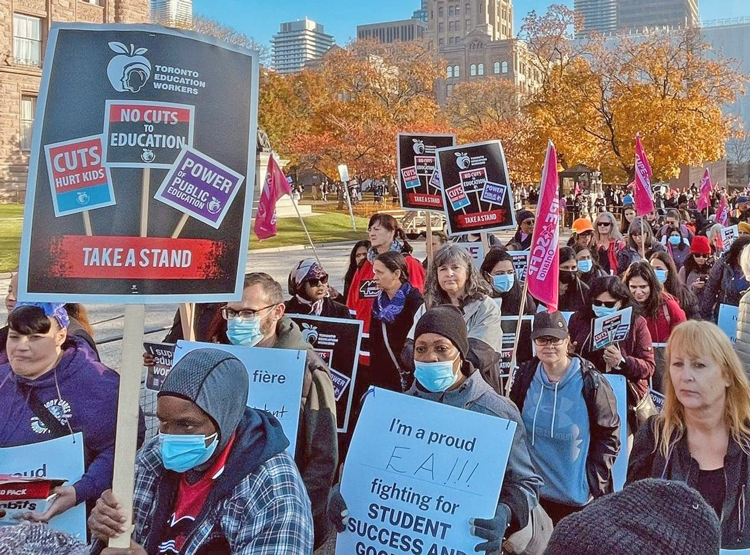MONTREAL — The Canadian Union of Public Employees continues to mobilize and gain widespread solidarity in the fight to win significant wage raises for its 55,000 members working in public education support jobs in Ontario and set an example of struggle for all working people. After the union conducted a militant two-day strike and weekend demonstrations in 12 cities across the province, Ontario Premier Douglas Ford on Nov. 14 repealed the draconian anti-labor Bill 28 he had pushed through the provincial legislature Nov. 3.
That law banned the workers from striking, threatened both the union and every individual member who did strike with heavy fines and imposed a four-year contract that contained miserably low wage “increases” well below the rate of inflation — in other words, wage cuts.
The workers, backed by a galvanized labor movement, and with the support of a majority of parents and many students, defied the law, shutting schools across the province. In Toronto and dozens of communities across Ontario thousands took to the streets in picket lines and demonstrations of solidarity.
Union leaders from both private and public sector unions and federations working with the Canadian Union of Public Employees began planning for a province-wide strike and public protest.

On Nov. 7 Ford, recognizing his administration had badly miscalculated the reaction of working people and the unions to Bill 28, buckled under the pressure and agreed to repeal the law if the school workers went back to work. CUPE officials agreed, but only if the government gave them a commitment in writing. After they received it, they went back, determined to continue their fight for an acceptable contract.
On Nov. 12, as part of “Solidarity Saturday” actions in a dozen Ontario cities, some 250 school workers, teachers and other unionists demonstrated in front of Ford’s constituency office in Toronto. They chanted, “So, so, so, solidarity!” “We aren’t done yet,” “Repeal Bill 28 now,” and “We want a fair deal!”
“We are standing up for what the kids and we need,” Nazma Akther, lunchroom supervisor at Kingview Village elementary school, told the Militant at the rally.
“The CUPE education workers — the big majority are women — carried out an ‘illegal’ strike to defend our fundamental rights,” CUPE Ontario President Fred Hahn told the crowd to cheers. “They put their bodies on the line. We will reignite the power of the labor movement together.”
A Canadian Union of Public Employees’ leaflet handed out at the action explained that “funding for schools over the last four years has been cut by $800 per student,” including a total of “$1.6 billion in cuts in 2021-22 alone.” Over 51% of school workers must work a second job to make ends meet, the union said.
Along with tens of thousands of other government workers, including teachers, the school workers — the lowest paid of all government workers — have faced a virtual wage freeze since 2019. That’s when the provincial government passed Bill 124, another anti-labor measure that capped wage increases for all public workers at 1% or less each year for the three years following the end of their current union contracts.
The teachers’ unions are now in negotiations with the government, since their contracts expired Aug. 31. The outcome of the fight of the school workers, whose three-year wage cap is up, will directly affect what teachers and other public-sector workers can fight for and win.
Hearings began in September on a court challenge to Bill 124 filed by a coalition of over 40 unions and associations. The school workers’ victory repealing the government’s anti-strike legislation is an important boost to this fight.
After negotiations between CUPE and the government restarted, the Ford government proposed a two-tier wage increase, claiming it would help the lowest-paid workers.
“We have been clear, a deal will be made which is a substantial flat-rate increase,” the CUPE bargaining committee said, rejecting the proposal.
With Bill 28 knocked out of the way, the Canadian Union of Public Employees stressed that the education workers are free to strike again, if that is what’s necessary to win the kind of wage increase they need.


